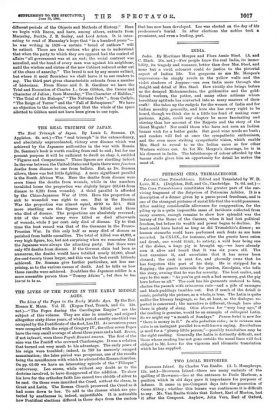PETRONII CENA TRIMALCHIONIS.
Petronii Cena Trimalchionis. Edited and Translated by W. D. Lowe, M.A. (Deighton, Bell, and Co., Cambridge. Is. 6d. net.)— The Cena Trimalchionis constitutes the greater part of the sur- viving fragment of the Batyricon of Petronius Arbiter. It is a description of a dinner given by a purse-proud freedman, and is one of the strangest pictures of social life that the world possesses. After making considerable allowance for exaggeration, for the piling up in a quite impossible mass of incidents collected from many sources, enough remains to show how splendid was the luxury of the Rome of the Caesars, when it had lost political freedom, but before its wealth and power began to decline. No feast could have lasted as long as did Trimalchio's dinner; no human stomachs could have performed such feats as are here recorded. In CXLIX., for instance, after the guests have eaten and drunk, one would think, to satiety, a wild boar being one of the dishes, a huge pig is brought up,—we have already seen it alive and heard that it was six years old. The host examines it, and ascertains that it has never been cleaned ; the cook is sent for, and gloomily owns that he has forgotten this part of his duty. He is stripped for a flogging ; the guests intercede for pardon, Encolpius, who tells the story, owning that ho was for severity. The host smiles, and says to the man : "As you've got such a bad memory, gut the pig here before us all." The cook has his garments restored to him, slashes the paunch with criss-cross cuts—and a pile of sausages and black-puddings tumbles out. But if much of the detail is comic, probably the picture, as a whole, is true. The Latin is quite unlike the literary language, so far, at least, as the dialogue re- ported is concerned ; the narrative is different, though here also there is plenty of slang. 0/im (diem?' for "very long ago," if the reading is genuine, would be an example of colloquial Latin. So we might say "a month of Sundays." Panem habet is new for "there is money in it." In olio peduclum vides ; in to ricinum non vides is an inelegant parallel to a well-known saying. Bacciballuni is used for a "plump little person,"—possibly basioballum may be the right reading. Generally the Latin is distinctly difficult, and those whose reading has not gone outside the usual lines will feel obliged to Mr. Lowe for the vigorous and idiomatic translation which he has supplied.


























































 Previous page
Previous page